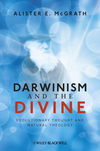Darwinism and the Divine: Evolutionary Thought and Natural Theology
 Darwinism and the Divine: Evolutionary Thought and Natural TheologyISBN: 978-1-4443-3344-2
Paperback
320 pages
February 2011, Wiley-Blackwell
This is a Print-on-Demand title. It will be printed specifically to fill your order. Please allow an additional 10-15 days delivery time. The book is not returnable.
Learn more about this book
|
|||||||
Darwinism and the Divine: Evolutionary Thought and Natural Theology
- Alister E. McGrath, critically acclaimed and world-renowned theologian and commentator on religion and science, offers a detailed and historical treatment of the interaction between Darwinism and Christianity
- Includes his view that the relatively new war between atheism and belief, as championed by authors Richard Dawkins and Daniel Dennett, essentially perpetuates a myth about Darwin the man and his own more ambiguous worldviews on faith and creation
- McGrath traces the impact of Darwinism on theology from the time of the publication of On the Origin of the Species to current debates on creationism, intelligent design, “memes,’ and “Universal Darwinism.”
- The most detailed account of the intellectual background to William Paley’s natural theology available
Why must the argument for Christian faith and the theory of evolution remain in conflict? In Darwinism and the Divine (March 2011) world-acclaimed theologian Alister E. McGrath asserts that Charles Darwin's theory of natural selection, first introduced in his On the Origin of Species in 1859, did not mark the demise of all forms of natural theology. McGrath asserts that Darwin’s own faith and worldview allowed for complexities and intricacies regarding the intersection of faith and science, “Natural theology, however it is defined, has to do with borderlands — the threshold of Christian belief and experience of the natural world. Natural theology complements the natural sciences.”
McGrath disputes the idea that Darwin stumbled across his theory of natural selection in a “eureka moment” on the Galapagos, but instead “is an intellectual explorer who drew upon the intellectual resources of his day in a collaborative and congenial manner, even if he would ultimately challenge and change the consensus of his generation.”
Furthermore, McGrath argues that the relatively new war between atheism and belief, as championed by authors Richard Dawkins and Daniel Dennett, essentially perpetuates a myth about Darwin the man and his own more ambiguous worldviews on faith and creation, “Darwin had no quarrel with the idea of God, nor even with the notion of God as creator. His dispute was specifically with the doctrine of special creation — namely, that God created individual species adapted to specific environments within an essentially static natural order,” and that his personal trauma regarding his daughter’s death, rather than his scientific discoveries, may have caused him to challenge his own conventional religious beliefs.
Inspired by the 150th anniversary of Darwin’s publication of the Origin of Species Darwinism and the Divine explores the various forms of natural theology that emerged in England from the late 17th century until 1850, and integrates and extends the latest scholarly research from across a wide variety of disciplines, including William Paley, Newton, Thomas Henry Huxley, Plato, Thomas Aquinas, Freud, Iris Murdoch and C.S. Lewis.
McGrath introduces the idea that perhaps Darwin's "dangerous idea" instead served to transform and illuminate our views on the relation between the natural world and the divine in the deist tradition rather than the exclusively Trinitarian context. McGrath traces the impact of Darwinism on theology from the time of the publication of On the Origin of the Species to current debates on creationism, intelligent design, “memes,’ and “Universal Darwinism.”




